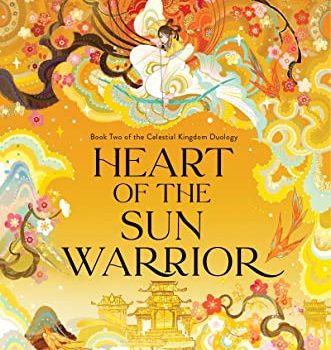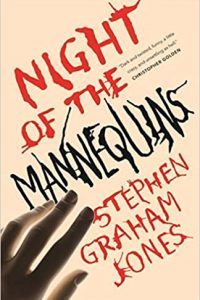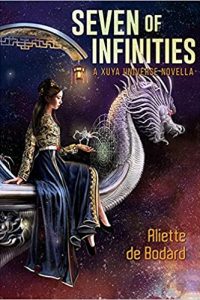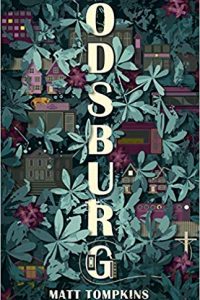Maya C. James Reviews Heart of the Sun Warrior by Sue Lynn Tan
 Heart of the Sun Warrior, Sue Lynn Tan (Harper Voyager 978-0-063031364, $27.99, 480pp, hc) November 2022. Cover by Kuri Huang.
Heart of the Sun Warrior, Sue Lynn Tan (Harper Voyager 978-0-063031364, $27.99, 480pp, hc) November 2022. Cover by Kuri Huang.
Xingyin has already done the impossible by freeing her mother, moon goddess Chang’e, from the Celestial Empire’s imprisonment. But when a strange magic emerges from her home, she must flee once again to protect those she loves.
Heart of the Sun Warrior is the final installment of Sue Lynn Tan’s Chinese-inspired romantic epic fantasy duology The Celestial Kingdom. Taking place shortly after the events of Daughter of the Moon Goddess, Xingyin struggles to adjust to her new life. No longer slaying monsters or hiding her identity, she spends her days playing her qin, lighting lanterns, and catching up on lost time with her mother. In these first chapters where only whispers of danger lurk, readers get to see the mother anddaughter enjoy her new freedom.
As I mentioned in my review of Daughter of the Moon Goddess, the prose is undeniably gorgeous. Lyrical in nature, Tan offers flawless worldbuilding for these heroes to rise in power. Like the legend of Chang’e, Tan expands upon Chinese myths and legends from her childhood throughout the novel – Xihe, the sun goddess, and Wu Gang, the laurel woodcutter, and many others make appearances with unique variations to their original tales.
Xingyin is written in the same grandiose nature as these legendary tales. In the moments where Xingyin is faced with overwhelming grief and loss, she meets each moment with surprising clarity and decisiveness, even putting aside her infamous temper that often got her in trouble in the first novel. Xingyin almost seems too perfect – constantly willing to sacrifice herself and accepting difficult alliances. I think one of my favorite scenes was when she was not this battle-hardened hero, but one in the making. But I do emphasize that she is ‘‘almost’’ too perfect. Nothing comes easily to Xingyin, despite her disciplined skills as a warrior, and there is a surprising amount of sacrifice and death considering the ease with which she appears to win her battles. I did wish to see more of her infamous temper, as her lack of anger felt somewhat out of character, even if her level-headedness was a new sign of maturity.
Although Xingyin has a more moderate temper in this book, the drama surrounding her is exceptional. There seems to be bitterness and animosity between at least two characters on any given page. I found myself cackling over the petty, badly-behaved Immortals, and the sharp exchanges between characters. Whenever I wasn’t concerned about a supporting character dying in battle, my attention was fully captured by the unique and complex dynamics between the characters.
While I can appreciate longing stares and unrequited love in romantic genres, the tonal shift did not make sense for at least one of the romantic interests. To have the romantic interests speak so formally to Xingyin felt particularly rigid during tender moments, and a backsliding of the intimacy they had developed in the first novel. The passion and humor between them seemed muted – or far more subtle – by comparison, but I would have enjoyed it more if the first novel read similarly.
Even with epic battles and fight scenes occupying most of Heart of the Sun Warrior, readers learn much more about Xingyin’s relationships and emotional bonds with her friends, family, lovers, and allies. Her duty to protect her home comes above all else, but quiet moments between her and those she is closest to lead her to question the heroic path she has chosen. While love triangles can be polarizing, this one matured beyond petty drama into a touching and intricate series of questions about love, duty, grief and hope. I don’t think I truly became invested in the romantic arcs until the very end of the novel. We must talk about the ending of Heart of the Sun Warrior – Tan absolutely exceeded my already-high expectations with the conclusion to her story. Not only does she give ample time to resolve every plot thread, but left me breathless with her lush prose and enchanting storytelling. The Celestial Kingdom duology is a stunning debut, and I am excited to see what magic Sue Lynn Tan brings to her next project.
Maya C. James is a graduate of the Lannan Fellows Program at Georgetown University, and full-time student at Harvard Divinity School. Her work has appeared in Star*Line, Strange Horizons, FIYAH, Soar: For Harriet, and Georgetown University’s Berkley Center Blog, among others. She was recently long listed for the Stockholm Writers Festival First Pages Prize (2019), and featured on a feminist speculative poetry panel at the 2019 CD Wright Women Writer’s Conference. Her work focuses primarily on Afrofuturism, and imagining sustainable futures for at-risk communities. You can find more of her work here, and follow her on Twitter: @mayawritesgood.
This review and more like it in the January 2023 issue of Locus.
 While you are here, please take a moment to support Locus with a one-time or recurring donation. We rely on reader donations to keep the magazine and site going, and would like to keep the site paywall free, but WE NEED YOUR FINANCIAL SUPPORT to continue quality coverage of the science fiction and fantasy field.
While you are here, please take a moment to support Locus with a one-time or recurring donation. We rely on reader donations to keep the magazine and site going, and would like to keep the site paywall free, but WE NEED YOUR FINANCIAL SUPPORT to continue quality coverage of the science fiction and fantasy field.
©Locus Magazine. Copyrighted material may not be republished without permission of LSFF.








